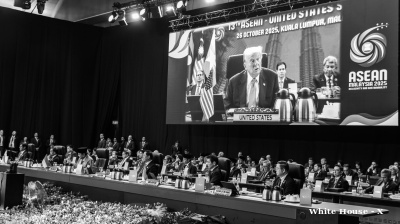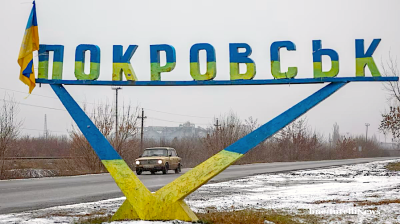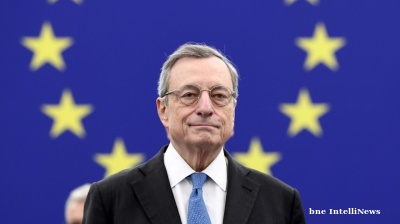Ukraine’s neighbours are preparing for the arrival of a wave of refugees following the Russian invasion of the country in the early hours of February 24. There are already reports of Ukrainians crossing the borders into Moldova, Poland, Romania and other countries.
Neighbouring countries as well as those further away such as the Baltic states have already said they are ready to accommodate hundreds of thousands of refugees in total.
bne IntelliNews’ correspondent in Kyiv, Cameron Jones, reported by telephone on the morning of February 24 that people were fleeing the capital in large numbers after attacks began at 5am local time.
Locals told bne IntelliNews that some Ukrainians are hoping to cross the border to neighbouring Poland, Romania and Slovakia. Leaving by plane is not possible after flights were cancelled following reported drone strikes on all of the airports in the country. Others have decided to stay put and wait for further developments as Russian bombings across several areas of Ukraine indicate nowhere in the country can be considered safe.
Moldova reports first refugee arrivals
Moldova confirmed around 1,900 people had entered from Ukraine as of the morning of February 24, and several thousand more were reported later in the day.
Moldova plans to keep its borders with Ukraine open and to accommodate refugees. Before both Moldova and Ukraine closed their airspace over safety concerns, planeloads of people arrived in Chisinau from Ukraine.
“At the border crossing points with Ukraine there is an increase in transit flow, our institutions are installing sorting centres. We will help people who need our support. At the moment, we are ready to accommodate tens of thousands of people. At the same time, the government is in constant contact with international organisations and we have prepared several scenarios in case we have a larger influx of refugees,” President Maia Sandu said at a briefing on February 24.
“We are carefully monitoring the evolution of the situation in the country and in the region. We are in contact with the authorities in neighbouring states and with other external partners. In this context, my request to citizens is that we should all be understanding and ready to help each other.”
Minister of Internal Affairs Ana Revenco also gave a briefing on the morning of February 24, at which she announced that as of 11am around 1,900 Ukrainian citizens, including some entire families, had registered as crossing the border.
“At the moment, the focus is on managing the risk of a larger influx of migrants registered at the border of the Republic of Moldova. In this regard, the situation plan on managing the flow of migrants has already been activated,” Revenco said, according to a ministry statement.
“[A]dditional forces have already been deployed at several border crossing points to streamline the influx of people,” she added.
“It has also been ordered to set up Temporary Migrant Sorting Centres, adjacent to border crossing points, so that the process of crossing and managing the flow is easy and respectful of the needs and requirements of these citizens.”
Romania prepares to host up to 500,000 refugees
Romanian Minister of Defence Vasile Dincu announced on February 22 that the country is preparing to receive up to 500,000 refugees from Ukraine in case of an invasion by Russia. Romania has a 600-km long border with Ukraine in the northeast of the country.
"There are several estimates, but we could receive over 500,000 refugees, that is ... the number for which we have prepared alongside the interior ministry and other institutions," Dincu told reporters, Reuters reported.
"There is a plan prepared for all large cities, there are areas for this near the borders."
As the situation became increasingly tense earlier in the month, Interior Minister Lucian Bode previously announced that the government was drawing up a plan including temporary mobile camps in northeast Romania.
After a meeting with top officials on February 24, Bulgarian President Rumen Radev said his country will host Ukrainians seeking refuge.
“I want to address all Bulgarians in Ukraine, as well as all Ukrainian citizens who wish to seek a refuge in Bulgaria – we are open. We shall do anything for them to be transported in a safe way to Bulgaria and to get all the necessary aid here,” Radev said.
Countries in the region have also urged their own citizens to return home from Ukraine. Bulgaria has received more than 4,000 requests for refuge from Bulgarians living in Ukraine in just in a few hours and will arrange their safe transportation to the country, Radev said on February 24. Prime Minister Kiril Petkov said that a top priority now is to help all Bulgarians living in Ukraine to safely leave the country. The government is organising their transportation, the processing of data and accommodation in hotels and other facilities in Bulgaria.
Polish border quiet but many refugees expected
Crossings on the Ukrainian-Polish border were relatively quiet in the morning and afternoon of February 24 following the outbreak of the war. There were reports, however, of people beginning to cross into Poland, pushed out by the escalating conflict. Polish media reported about a train from Kyiv – which set out the previous evening – arriving in Warsaw with Ukrainians who decided to leave their capital early.
“We do not see an influx of refugees from Ukraine at the moment, the border crossings are functioning as usual,” Ukraine’s ambassador to Poland Andriy Deshchytsa told the Polish state newswire PAP.
The independent Belarusian TV Belsat also reported that some Ukrainians were going into Poland via the crossing point in Medyka, 85 kilometres from Lviv, Ukraine’s seventh-largest city.
As Russian forces began the attack at dawn on Thursday, Poland stepped up preparations for helping what observers say will be an inevitable reality of thousands of refugees seeking safety.
The government plans to open nine so-called reception centres close to Poland’s border crossings with Ukraine, the Polish home affairs ministry said.
Poland’s Ministry of Health also said that it would launch a train to transport any wounded people from the border to one of 120 hospitals tasked with helping the victims of Russian aggression.
Slovakia ready to help all refugees
The Slovak government led by Prime Minister Eduard Heger condemned Thursday's action taken by Russian President Vladimir Putin against Ukraine. He also confirmed that Slovakia is ready to provide assistance to people fleeing the war in Ukraine.
“Russia has attacked the weaker, whose only fault is that it wanted to live peacefully according to its own ideas like other sovereign nations," Heger wrote on his Facebook profile, adding that Ukraine has all rights to defend itself and Slovakia in cooperation with Nato and the EU will help Ukraine.
The PM also said that the Slovak armed forces and the police will ensure that borders are crossed in a controlled manner and that Ukrainian refugees will be provided support. "It can be said almost with certainty that Russian aggression will drive many Ukrainians from their country, let's show compassion and understanding for them," the PM was quoted as saying by the Slovak News Agency.
"Slovakia will diligently observe the principles of humaneness and solidarity, just as they were observed by others when our parents or grandparents were fleeing war and the invasion of our country," Heger added.
According to Defence Minister Jaroslav Nad, the eastern border with Ukraine should be militarily reinforced, thus Slovakia will send 1,500 troops to its eastern border. According to the latest data, the current waiting time at the Slovak-Ukrainian border at Vysne Nemecke/Uzhgorod reached five hours. The Slovak interior ministry said that entry to Slovakia from Ukraine would be allowed even for persons who do not carry a valid travel document.
In Hungary, the authorities, churches, and charity groups are preparing for the flood of refugees. Traffic has jammed up at the half dozen border crossings on the 130km long border with Ukraine, with a waiting time of one to two hours, according to police reports from late afternoon.
Baltic states to welcome refugees
On February 23, hours before Russia's military attack against Ukraine, Lithuanian Prime Minister Ingrida Simonyte said its government “would welcome” Ukrainian refugees fleeing war.
Lithuanian Interior Minister Agne Bilotaite also said earlier the day that the country’s authorities were preparing to take in refugees from Ukraine if needed.
“It would be difficult to speak about specific numbers, but we are…modelling different scenarios and situations…We understand that one way or another, our state has to be prepared, whether it is 3,000 or more than 30,000 people,” the minister told Lithuanian media.
The interior ministry has sent out inquiries to municipalities, asking them where they could accommodate refugees and how they could provide them with various services and assistance, according to Bilotaite. Non-governmental organisations are also involved in preparation works, she added.
Meanwhile, Lithuania’s Deputy Interior Minister Vitalij Dmitrijev has said that Lithuania is prepared to accept around 8,000 refugees from Ukraine.
“The municipalities could accept 6,000 refugees. The education ministry said it could accommodate another couple of thousand people. So, we have a total of around 8,000 places,” Dmitrijev told reporters on Tuesday, February 22.
According to him, such a number of refugees could be accommodated in various municipal and ministerial premises. In his words, Lithuanian municipalities have offered various types of premises for accommodating potential refugees from Ukraine.
In total, Lithuania could accept up to 50,000 refugees from Ukraine if there was such a need, he added. If the number of refugees increased drastically, all municipalities in the country would have to contribute to accommodating Ukrainians, who "would be spread proportionally", according to the deputy interior minister.
The Lithuanian education, science and sport ministry announced on February 24 it is collecting information on available accommodation as part of preparations for a potential influx of refugees after Russia launched a military operation in Ukraine.
“We have sent out inquiries to all educational institutions about available premises suitable for accommodation, such as dormitories and empty buildings,” Education Minister Jurgita Siugzdiniene said.
In Latvia, a plan for the reception and accommodation of refugees, developed by the Ministry of the Interior, foresees accepting up to 20,000 Ukrainian refugees.
Interior Minister Maria Golubeva said that the plan provided for accommodation, distribution of basic necessities, as well as vaccination against COVID-19 and testing, with arrivals accommodated in hotels and guesthouses in coordination with municipal authorities.
Local governments are also ready to provide assistance to Ukraine, the Latvian Association of Local Governments pointed out.
Contributions from bne IntelliNews correspondents in Central and Southeast Europe.
News

Trump pledges enduring support for Southeast Asia as new trade deals signed
During his visit to Southeast Asia, US President Donald Trump declared that Washington would remain a steadfast ally to the region, as he signed a series of trade agreements with four ASEAN member states.

US grants 0% tariffs to Malaysia alongside Cambodia and Thailand
US President Donald Trump has approved a 0% tariff scheme for selected goods from Malaysia, Cambodia, and Thailand, a move formalised during the ASEAN Summit in Kuala Lumpur.

Russia test fires its Burevestnik nuclear-powered cruise missile
Russia’s Burevestnik nuclear-powered cruise missile has no analogues in the world, Russian President Vladimir Putin said, as the Kremlin escalates the unfolding missile arms race with Ukraine another notch.

Russia claims to surround Pokrovsk
Russia’s chief of the general staff Valery Gerasimov triumphantly reported to Putin that 31 Ukrainian battalions have been encircled in Pokrovsk and 18 battalions in Kupyansk, the hottest spot in the war.
.jpg)
_Cropped.jpg)


